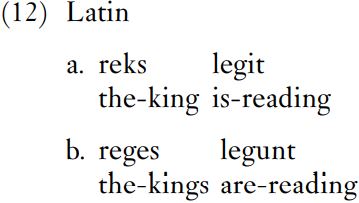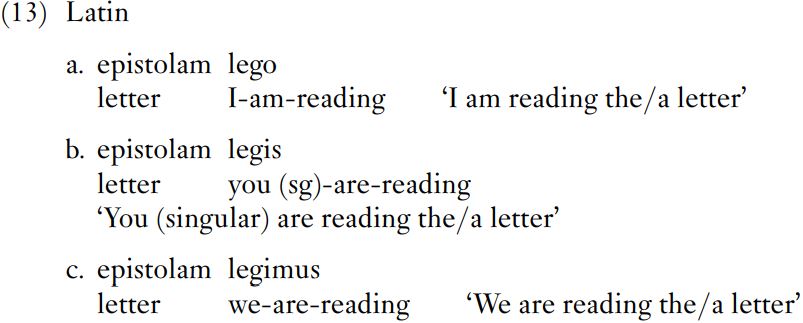


 Grammar
Grammar
 Tenses
Tenses
 Present
Present
 Past
Past
 Future
Future
 Parts Of Speech
Parts Of Speech
 Nouns
Nouns
 Verbs
Verbs
 Adverbs
Adverbs
 Adjectives
Adjectives
 Pronouns
Pronouns
 Pre Position
Pre Position
 Preposition by function
Preposition by function 
 Preposition by construction
Preposition by construction
 Conjunctions
Conjunctions
 Interjections
Interjections
 Grammar Rules
Grammar Rules
 Linguistics
Linguistics
 Semantics
Semantics
 Pragmatics
Pragmatics
 Reading Comprehension
Reading Comprehension|
Read More
Date: 2023-08-24
Date: 2023-02-04
Date: 2-2-2022
|
We turn now to the final strand of syntactic linkage in Latin, the relationship between subject nouns and verbs. Consider (12).

In (12a), reks is singular and the verb leg- (read) has the suffix -it, which is singular. In (12b), reges is plural and leg- has the suffix -unt, which is plural. The traditional formula is that the verb agrees with the subject noun in number (and person). This analysis accords with the view that the subject noun (phrase) is more important than the other nouns in a clause because speakers use subject nouns to name the entity they want to talk about. At various places in this introduction, however, we have seen that there are good reasons to consider the verb the head of a given clause, controlling all the other words and phrases in it. From the perspective of dependency relations and the lexicon, the relation between the verb and subject noun is no different from the relations between the verb and other nouns in clauses.
Whichever analysis readers favour, the term ‘agreement in number’ is not accurate. Either the subject noun imposes a given number on the verb or the verb imposes a given number of the noun. That is, both analyses recognize a controlling word, and where there is a controlling word we are dealing with government.
Verbs in Latin signal more than just number. Other suffixes are added to verb stems in Latin, as shown in (13).

The contrast between lego in (13a) and legis in (13b) has to do with who is presented as reading, the speaker or the addressee. The speaker is considered the central participant in a conversation, the first person. The addressee is the second in importance, that is, is the second person. The speaker and others can be presented as jointly doing something, as in (13c). Lego is described as being in the first person singular, legimus as being in the first person plural and legis as being in the second person singular. In (12a, b), the speaker presents the action as being performed by neither the speaker nor the hearer but by a third person in (12a) and by third persons in (12b). Legit is said to be in the third person singular, and legunt is described as being in the third person plural. Latin has pronouns, but they were not used unless for emphasis.
|
|
|
|
"إنقاص الوزن".. مشروب تقليدي قد يتفوق على حقن "أوزيمبيك"
|
|
|
|
|
|
|
الصين تحقق اختراقا بطائرة مسيرة مزودة بالذكاء الاصطناعي
|
|
|
|
|
|
|
قسم شؤون المعارف ووفد من جامعة البصرة يبحثان سبل تعزيز التعاون المشترك
|
|
|